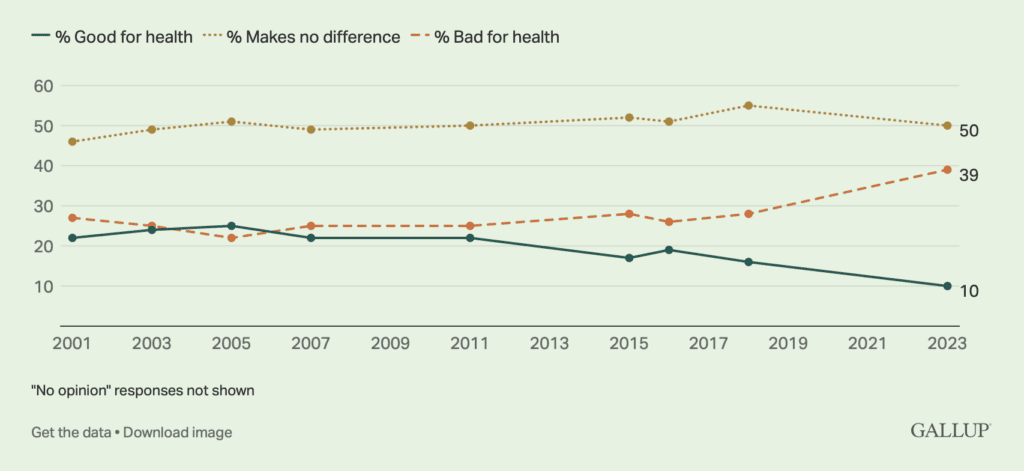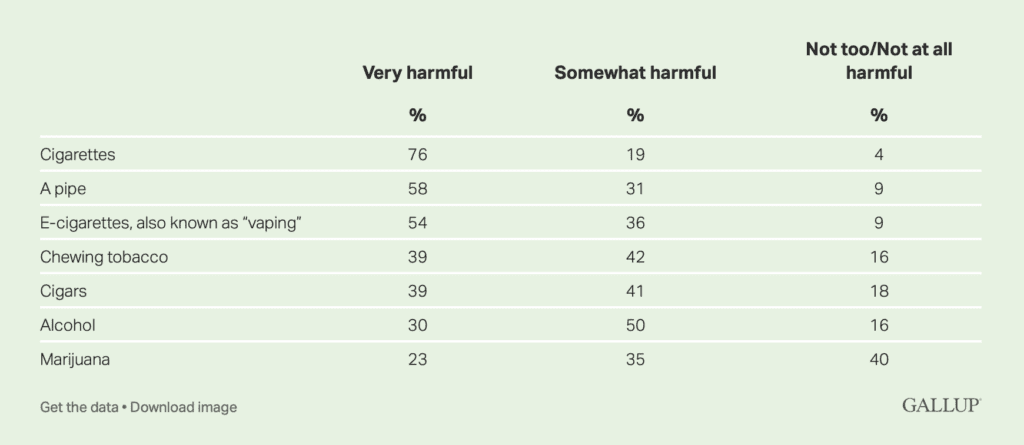Most U.S. Americans now believe alcohol is more harmful than marijuana, new Gallup polling reveals, driven largely by the feelings of young adults.
Younger people are growing more wary of alcohol, according to data from Gallup Consumption Habits poll conducted during the summer of 2023.
In fact, the percentage of young people who think consumption of small amounts of alcohol is bad for health has increased significantly since 2018.
- 39% say consuming alcohol in low dose amounts is bad for one’s health.
- This an increase of 11 percentage points since 2018.
- The shift largely reflects changes among adults aged 18 to 34 years.
- Alcohol is viewed as less harmful than tobacco, but more harmful than marijuana.
At the same time, half of U.S. adults believe that consuming small amounts of alcohol makes no difference concerning health risk, while 10% still claim it was good for one’s health. The last two figures are down five and six points, respectively, compared with five years ago – showing that the myth alcohol was good for human health is getting weaker, even in U.S. adults.
More U.S. Americans view consumption of small amounts of alcohol as bad for health
Gallup has asked this question nine times since 2001, including in its most recent Consumption Habits Survey, conducted between July 3 to 27, 2023.

While the five-year time span since the prior reading is too long to attribute the change to any specific event, it comes after the Centers for Disease Control and Prevention updated its dietary guidelines for alcohol intake, and the World Health Organization published research showing that no level of alcohol is safe for one’s health. The WHO recommendation takes a clear position against the idea that consuming small amounts of alcohol can be beneficial for human health, considering alcohol’s cancer risk.
Biggest Change in Perceptions of Harm Is Among Younger Americans
The increased belief that “moderate” alcohol consumption is detrimental is owed largely to young adults aged 18 to 34 years, among whom it has risen 18 percentage points since 2018. That compares with a 13-point increase among middle-aged adults and virtually no change among those 55 and older.

About 52% of respondents between the ages 18 to 34 said consuming small amounts of alcohol is bad for health, while only 29% of those 55 and older felt the same way.
Back in 2018, only 34% of young adults said consuming small amounts of alcohol was detrimental to health, in comparison to 26% of those 55 and older.
This shift coincides with more recent consumer trends favoring alcohol-free products, including a growing “mocktail” industry as nonalcoholic alternative party elixirs become more popular among younger U.S. Americans.
Other notable differences between groups include by gender, with women (41%) more likely than men (35%) to view consuming small amounts of alcohol as harmful to one’s health.
Regional disparities are also apparent. U.S. Americans living in the Western (44%) and Midwestern (44%) regions of the U.S. are more likely than those in the East (34%) or South (35%) to view alcohol use in small amounts as harmful.
People who do not identify with a religion (47%) are more likely than people identifying as Christian (35%) to view alcohol use in small amounts as health harmful.
U.S. Adults view alcohol as less harmful than tobacco but more harmful than marijuana
When compared with other addictive substances, U.S. adults perceive alcohol as less harmful than a variety of tobacco and nicotine-based products. While three in four say cigarettes are “very harmful” to one’s health, fewer view chewing tobacco or cigars in this way, and an even lower 30% say this about alcohol.
As public awareness of the harms of vaping has increased, over half of Americans say using e-cigarettes or vaping is very harmful to one’s health.
Marijuana garnered the lowest level of health concern in comparison to other addictive substances, but separate Gallup research has shown that three in four U.S. adults are very or somewhat concerned about the effects marijuana has on young adults and teens who use it regularly.

Data from other national surveys add more context to improving recognition of the health risks linked with low dose alcohol use.
Monitoring the Future is an ongoing study of substance use behaviors and attitudes of U.S. American adults 19 to 60 years old.
When asked about alcohol use, nearly 74% of people in the U.S. between 18 to 25 years reported using alcohol during their lifetime; the percentage was 84% for those 50 and older, according to the National Survey on Drug Use and Health.
More than 140,000 Americans die due to alcohol annually, according to the Centers for Disease Control and Prevention.
Most U.S. Americans Underestimate Cancer Risk of Alcohol, Especially Wine
While recognition of the health risks linked with low dose alcohol use is improving in U.S. society, less than a third of people in the U.S. know that alcohol use is a risk factor for cancer. Even fewer, just over 20%, realized that consuming wine could raise the risk of cancer.
Alcohol caused an average of more than 75,000 cancer cases and almost 19,000 cancer deaths each year between 2013 and 2016, according to the American Association for Cancer Research.
Despite conclusive research showing that all alcoholic beverages, including wine, increase the risk of many types of cancer, a survey of nearly 4,000 U.S. adults found that people’s awareness of alcohol’s cancer risk remains extremely low.
About 31% of participants were aware of the cancer risk for liquor, followed by nearly 25% for beer and just over 20% for wine.
Some people even falsely believe alcohol lowered their cancer risk, including 10% of participants who said wine reduced risk, 2.2% who thought beer lowered risk and 1.7% who said that liquor did, the findings showed.
More than 50% of people reported not knowing the impact of these beverages on cancer risk.
The study also asked participants about heart disease and alcohol. About 39%, 36% and 25% of U.S. adults said they believed that liquor, beer and wine, respectively, increased heart disease risk.
Remarkably, the awareness numbers for alcohol and heart disease – while low – are better than for alcohol and cancer.
Survey respondents who were aware of the heart disease risks due to alcohol were more likely to say they knew of the alcohol-cancer link.
Alcohol is a leading modifiable risk factor for cancer in the United States and previous research has shown that most Americans don’t know this,” Seidenberg said as per UPI reporting.
Andrew Seidenberg, study lead, and cancer prevention fellow, U.S. National Cancer Institute
Unfortunately, the link hasn’t gotten much attention in the media, says Seidenberg, as per Yahoo reporting, who is now research director at Truth Initiative, a nonprofit public health organization.
Getting the message out there is especially important in a time when alcohol consumption is going up, especially among women,” said Katherine Keyes, Ph.D., professor of epidemiology at the Columbia University Mailman School of Public Health, according to Yahoo reporting.
Studies have shown the biggest increases are among women aged 30 to 45. We need to target messaging to the groups who are [consuming alcohol] more and more.”
Katherine Keyes, Ph.D., professor of epidemiology, Columbia University Mailman School of Public Health
Researchers suggest putting cancer warning labels on beverages could help raise awareness, according to The Hill reporting.
Research is definitely needed to identify messages and messaging strategies that can increase awareness,” Seidenberg said, according to Yahoo reporting.
Interventions that could help increase awareness of the alcohol-cancer link include mass media campaigns, cancer warning labels and patient-provider communications.”
Andrew Seidenberg, study lead, and cancer prevention fellow, U.S. National Cancer Institute
